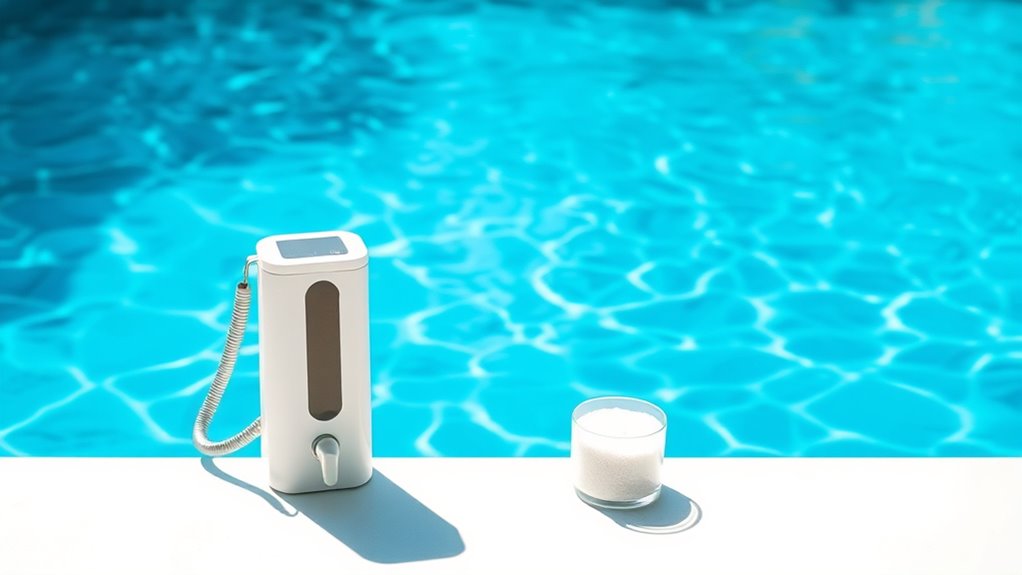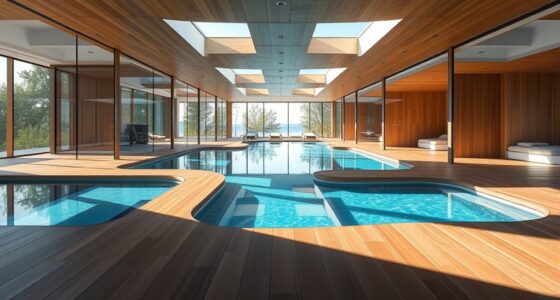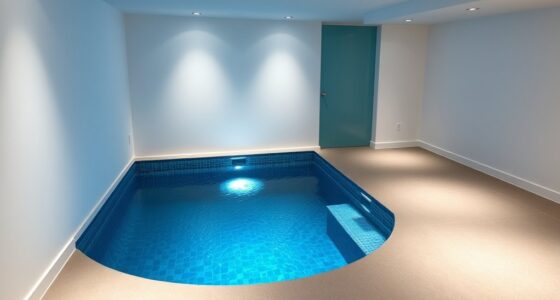Choosing between chlorine, salt, or UV for your Endless Pool depends on your preferences and lifestyle. Chlorine quickly sanitizes but can cause strong odors and skin irritation. Salt systems produce chlorine automatically, offering a smoother experience with less chemical smell. UV light disinfects without chemicals but needs energy and maintenance. Each system has benefits—explore which one fits your routine and enjoy clearer, safer water with less hassle. Keep going to discover more about making water care simple.
Key Takeaways
- Chlorine provides quick, proven disinfection but involves handling chemicals and odors, while salt systems produce chlorine automatically with less chemical use.
- UV light disinfects water without chemicals, reducing odors and skin irritation, but requires energy and regular bulb maintenance.
- Salt systems offer continuous sanitation, lower chemical storage needs, and are cost-effective over time despite higher initial investment.
- Modern systems with digital monitoring and automation simplify maintenance, ensuring consistent water quality with minimal effort.
- Choose based on your swimming frequency, budget, space, and preference for chemical handling versus automated, chemical-free disinfection.
Understanding Chlorine: The Classic Pool Sanitizer

Have you ever wondered why chlorine remains the most popular choice for pool sanitation? It’s because chlorine is highly effective at killing bacteria, algae, and viruses quickly. You add it to your pool, and it forms a protective barrier that keeps the water clean and safe. Chlorine works by releasing disinfectant agents that break down organic contaminants, preventing algae growth and cloudy water. It’s also affordable and widely available, making it a convenient option for most pool owners. Plus, chlorine’s residual effect means it continues to sanitize even after initial application. While some worry about the smell or skin irritation, proper use and maintenance help manage these issues. Additionally, expert voiceovers are often used in advertising to emphasize chlorine’s reliability and effectiveness. Overall, chlorine’s proven track record keeps it at the forefront of pool water care options.
How Salt Systems Work and Their Benefits
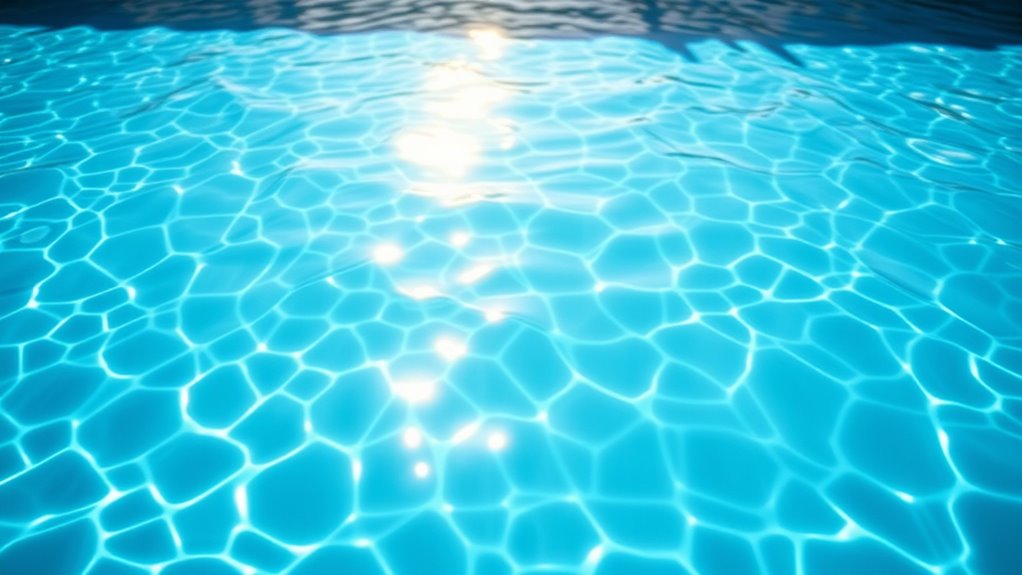
Salt systems use a salt cell to produce chlorine through electrolysis, providing continuous sanitization. This process keeps your pool water clean with less effort and fewer chemicals. As a result, you enjoy clearer water and a more comfortable swimming experience. Modern toilet fixtures can also be integrated into pool areas for added convenience.
Salt Cell Chlorination
Ever wondered how saltwater pools maintain crystal-clear water without the constant need for traditional chlorine? It’s all thanks to salt cell chlorination. When you turn on your system, the salt cell uses electrolysis to convert dissolved salt into chlorine gas, which sanitizes your pool. This process continuously generates a steady, low level of chlorine, keeping algae and bacteria at bay. The benefit? You won’t need to handle bulky chlorine bottles or worry about adding chemicals manually. Plus, saltwater pools tend to feel softer on your skin and eyes. Salt cell chlorination provides a consistent, automated sanitizing method that’s both effective and convenient. It simplifies pool maintenance, giving you more time to enjoy your swim instead of worrying about water chemistry. Additionally, understanding water chemistry balance is essential to ensure the system functions optimally and maintains water clarity.
Ongoing Sanitization Benefits
Saltwater systems continuously produce a low, steady level of chlorine through ongoing electrolysis, which keeps your pool sanitized without the need for manual chemical additions. This automatic process maintains consistent water quality, reducing the risk of algae and bacteria growth. Because the system generates chlorine continuously, you’re less likely to experience strong chemical smells or skin irritation often associated with traditional chlorine methods. Additionally, your pool requires fewer chemical adjustments, saving you time and effort. The gentle, consistent sanitization creates a more pleasant swimming environment. Plus, the reduced chemical handling minimizes exposure to harsh substances, making maintenance safer and more convenient. Furthermore, remote work habits can be integrated into pool maintenance routines, allowing for more flexible scheduling and less stress about upkeep. Overall, salt systems provide reliable, ongoing sanitation, ensuring your pool stays clean, clear, and inviting with less hassle.
Lower Chemical Usage
By generating chlorine automatically through electrolysis, salt systems substantially reduce the amount of chemical additives needed to keep your pool clean. You’ll use less traditional chlorine, which minimizes strong odors and skin irritation. This process produces a steady, low level of sanitizer, helping you maintain clear, balanced water effortlessly. Additionally, salt systems lower the risk of over-chlorination, making water safer for swimmers. Here’s a comparison:
| Feature | Salt System | Traditional Chlorine |
|---|---|---|
| Chemical Usage | Lower | Higher |
| Water Feel | Softer, silkier | Often harsher |
Switching to a salt system simplifies maintenance, saves money on chemicals, and creates a more comfortable swimming experience. Salt system efficiency can also contribute to long-term savings by reducing the need for frequent chemical adjustments.
The Role of UV Light in Pool Water Treatment

UV light offers an effective way to disinfect your pool water without chemicals. It kills bacteria and algae quickly, often with less maintenance than traditional methods. However, it’s important to understand how the process works, its advantages, and safety tips to keep your pool safe and clean.
UV Light Disinfection Process
UV light plays an essential role in modern pool water treatment by effectively destroying harmful microorganisms. When water passes through a UV sterilizer, the ultraviolet rays penetrate microbial cells, damaging their DNA and rendering them inactive. This process happens quickly and without chemicals, making it a safe and eco-friendly option. UV disinfection is highly effective against bacteria, viruses, algae, and other pathogens, ensuring cleaner water. It also reduces the need for high chlorine levels, minimizing chemical odors and skin irritation. Plus, UV systems are easy to maintain and operate, providing consistent disinfection. They’re a reliable complement to other treatment methods, enhancing overall water quality. Incorporating UV light improves your pool’s safety, comfort, and clarity, making water care simpler and more efficient.
A new sentence with AI-driven data analytics and the rest of the sentence.
Benefits Over Traditional Methods
Traditional pool water treatment methods, such as chlorination and filtration, often rely on chemicals and mechanical processes that can have drawbacks like strong odors, skin irritation, and ongoing maintenance. UV light offers a cleaner, chemical-free alternative that effectively inactivates bacteria and viruses without leaving residues. It reduces the need for large amounts of chlorine, minimizing harsh fumes and irritation. UV systems operate quickly, providing rapid disinfection that keeps water clearer and safer. Additionally, UV treatment requires less ongoing maintenance compared to chemical balancing, which can fluctuate with weather and usage. Modern UV devices often incorporate smart technology for enhanced monitoring and control, further simplifying pool care routines. Overall, UV light enhances water quality while simplifying care routines, making pool ownership more enjoyable and less stressful. It’s a modern solution that delivers effective, eco-friendly disinfection without the downsides of traditional methods.
Maintenance and Safety Consider
While integrating UV light systems into your pool requires careful attention, they are generally safe and easy to maintain when properly installed. UV systems effectively neutralize bacteria and algae without chemical residues, but regular checks are essential to guarantee ideal performance. Make sure the UV unit is correctly positioned and protected from debris. Safety precautions include avoiding direct exposure to UV light and ensuring the system has proper shielding. Routine maintenance involves cleaning the quartz sleeve and inspecting the bulb for signs of wear. Additionally, always follow manufacturer guidelines for operation and replacement schedules. Properly maintained UV systems can reduce chemical use and improve water clarity, making pool care simpler and safer. Regularly clean the UV system components, monitor the UV bulb’s lifespan and replace as needed, ensure proper shielding to prevent UV exposure, schedule routine system inspections, and follow manufacturer safety instructions. Understanding water treatment methods can help you choose the best system for your pool’s needs.
Comparing Maintenance and Operating Costs

When evaluating different pool water care options, understanding the ongoing maintenance and operating costs is essential. Chlorine systems often have lower upfront costs but can lead to higher long-term expenses due to purchasing chemicals regularly and managing potential equipment wear. Saltwater systems generally have higher initial costs for installation but tend to be more cost-effective over time, thanks to reduced chemical purchases. UV systems require an upfront investment in equipment but typically incur minimal ongoing costs, mainly for electricity and periodic bulb replacements. Consider your usage frequency and long-term budget when comparing these options. Salt systems and UV setups may save you money over years, while chlorine might be cheaper initially but add up with ongoing chemical and maintenance expenses. Additionally, understanding the cost implications of different water treatment methods can help you make a more informed decision.
Safety and Environmental Considerations
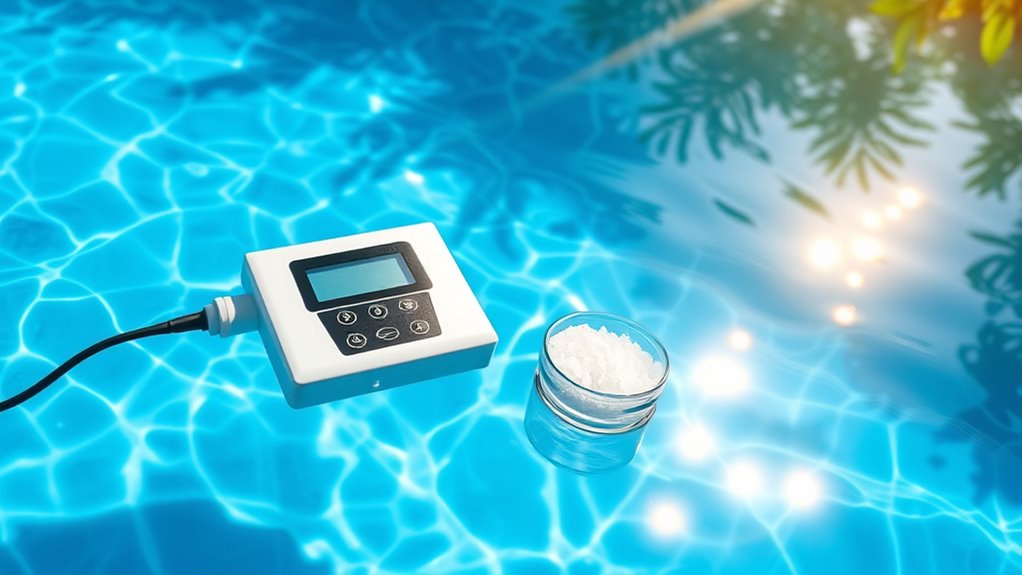
Choosing a pool water care system involves considering safety and environmental impacts. You want a solution that keeps your water clean without risking your health or harming the environment. Chlorine, for example, can cause skin irritation and release harmful fumes if not handled properly. Salt systems produce chlorine on-site, reducing chemical storage but still involve salt and byproducts. UV systems use light to disinfect, avoiding chemicals altogether, but require energy and maintenance. Additionally, the cost considerations of each system can influence long-term affordability and sustainability.
Ease of Use and Monitoring Your Water Quality
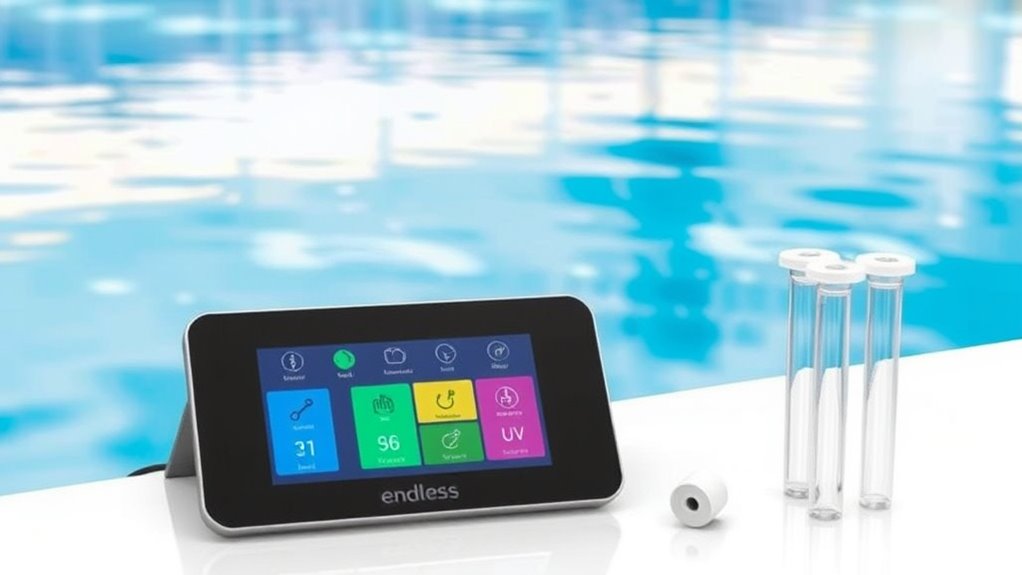
Selecting a pool water care system that’s easy to operate and monitor makes maintaining your pool less of a chore. With user-friendly controls and clear indicators, you can quickly check water levels, pH balance, and sanitizer levels without guesswork. Digital meters and automated systems simplify testing, saving you time and effort. Many systems offer remote monitoring via smartphone apps, so you can keep an eye on water quality anytime. Clear instructions and minimal maintenance requirements make it easier to stay on top of water care routines. By choosing a system designed for simplicity, you’ll reduce errors and avoid frustration, ensuring your pool stays clean and safe with less hassle. Ultimately, intuitive systems give you peace of mind and more time to enjoy your pool.
Choosing the Best System for Your Lifestyle and Pool Use
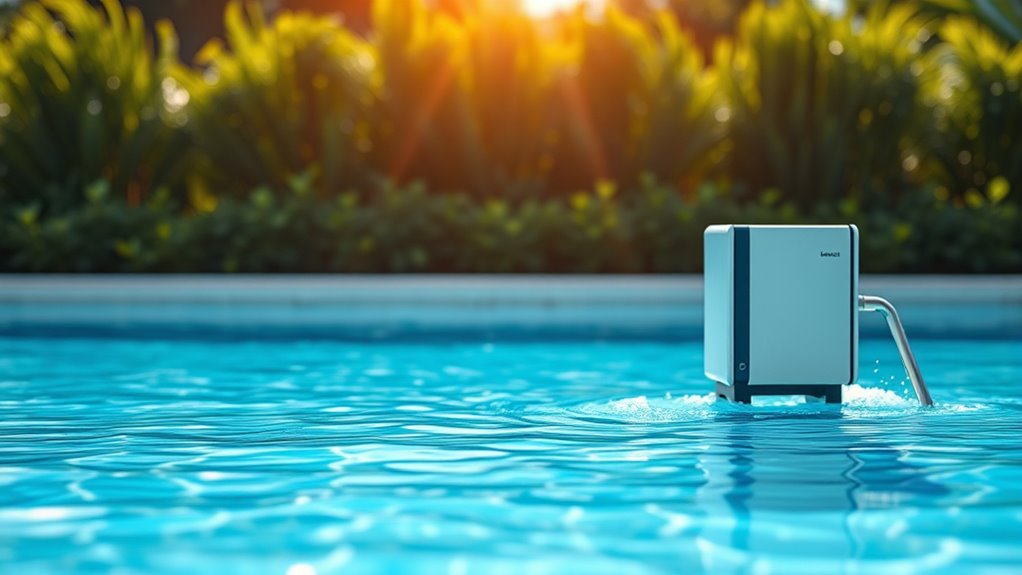
To find the right pool water care system, consider how often you use your pool and the level of maintenance you’re comfortable with. Do you swim daily or just weekends? Are you okay with regular testing and chemical adjustments, or do you prefer a low-maintenance option? Your lifestyle and pool use will guide your choice. For instance, if you want minimal effort, UV systems or salt chlorinators can automate sanitation. If you value control, traditional chlorine offers precise dosing. Think about space, budget, and your willingness to monitor water quality. The best system fits seamlessly into your routine, ensuring clean, safe water without hassle.
Choose a pool care system that matches your swimming frequency and maintenance preferences for hassle-free, clean water.
- Frequency of pool use
- Maintenance commitment
- Budget constraints
- Space available around your pool
- Preference for chemical management
Frequently Asked Questions
Can These Systems Be Combined for Optimal Water Quality?
Yes, you can combine these systems for ideal water quality. Using a combination of chlorine, salt, and UV treatments gives you a balanced approach that minimizes chemical use while maintaining clean, clear water. Salt systems generate chlorine naturally, UV sterilizes the water, and chlorine keeps bacteria at bay. Together, they work synergistically, providing a safer, more convenient, and low-maintenance solution for your pool’s water care.
What Are the Long-Term Durability Differences Among Systems?
You’ll find that UV systems often last longer than salt or chlorine options, thanks to fewer chemical components wearing out. Salt systems usually require more frequent replacements of electrodes, and chlorine systems depend on chemical balance and container durability. While UV units may have a higher initial cost, their long-term durability makes them a reliable choice for consistent water quality. Your decision should balance longevity, maintenance, and upfront investment.
Do System Types Affect Swimmer Skin or Eye Irritation?
Yes, system types can impact your skin and eye comfort. For example, salt and UV systems often cause less irritation compared to traditional chlorine because they generate fewer chloramines, which are linked to discomfort. If you have sensitive skin or eyes, choosing a system like UV or salt can make your swimming experience more pleasant. Always consider your personal sensitivities when selecting a water care system.
How Do Weather Conditions Influence System Effectiveness?
Weather conditions can substantially impact your pool’s water quality and system effectiveness. Hot, sunny days increase evaporation, requiring you to monitor water levels and chemical balance more frequently. Heavy rain can dilute disinfectants, reducing their effectiveness and introducing debris. Wind can blow dirt and leaves into your pool, making filtration work harder. To keep your pool pristine, adjust chemical levels as needed and run your system longer during extreme weather.
Are There Specific Pool Sizes Best Suited for Each System?
Think of your pool as a tailored suit—size matters. Smaller pools benefit from simpler systems like UV, which quickly neutralizes bacteria. Larger pools need more robust solutions, like salt or chlorine, to maintain clear water efficiently. Picking the right system depends on your pool’s size and usage. Match it correctly, and you’ll enjoy crystal-clear water without the hassle, making your pool your personal oasis.
Conclusion
Choosing the right water care system depends on your priorities, but remember, some believe salt and UV systems reduce chemical use and are gentler on your skin. While chlorine remains the classic choice, modern alternatives like salt and UV can offer safer, more eco-friendly options. Ultimately, no single method is perfect—consider your lifestyle, budget, and safety needs to find the best fit. After all, the true secret is maintaining clean, healthy water effortlessly.

